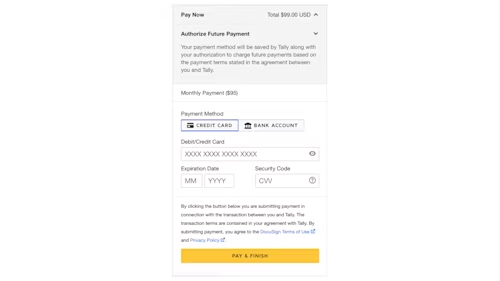
Cómo solicitar pagos digitales con firma electrónica
Docusign Payments ayuda a su empresa a recibir pagos instantáneamente cuando solicita un pago digital con firma.

Si todavía no estás cobrando pagos digitales al momento de la firma electrónica te estás perdiendo de una gran oportunidad para mejorar la experiencia de tus clientes y hacer que el efectivo fluya mejor.
La mayoría de las empresas recaban firmas con una solución de firma electrónica, pero después dan seguimiento por correo electrónico o con una factura para cobrar el pago. Esto alarga el proceso y también puede incrementar las tasas de adeudo. Según un análisis que realizó Fundbox entre 20 millones de facturas, el 64% de las pequeñas empresas se ven afectadas constantemente por el retraso en los pagos. Los problemas con pagos son una distracción cuando podrías estar enfocado en hacer crecer a tu negocio de otras formas. Ya hay tecnología disponible actualmente para cobrar un pago digital al momento de la firma electrónica. A continuación, explicamos los beneficios para las empresas cuando solicitan pagos con firma y cómo funciona a través de Docusign eSignature y Docusign Payments.
Solicita un pago digital con firma
Los pagos digitales ayudan a tu empresa a recibir pagos instantáneos cuando solicitas pago con firma. La tecnología y las integraciones te permiten cobrar pagos por única ocasión o guardar el método de pago de un signatario para hacer cargos en el futuro cuando se recabe una firma electrónica, lo cual es de especial utilidad para las organizaciones que necesitan con frecuencia cobrar pagos o cuotas por servicio.
Éstos son algunos ejemplos de cuándo solicitar un pago con firma electrónica:
universidades que aceptan pagos de alumnos por concepto de inscripción y colegiatura
compañías de software que solicitan pagos a miembros por cuotas de asociación
compañías de construcción que solicitan pagos para permisos
agencias gubernamentales que solicitan pagos de cuotas (registro vehicular, esto es de nacimiento)
organizaciones sin fines de lucro que solicitan pagos de donativos (el signatario ingresa la cantidad a donar)
firmas jurídicas, contables o de seguros que solicitan pagos por servicios
Para tus clientes, los pagos digitales son rápidos y convenientes.
Para ti, los pagos digitales eliminan costos, retrasos y riesgos por falta de pago que conlleva la facturación manual:
Disminuye el tiempo de pago: recibe pagos instantáneos y evita retrasos en la liquidación de adeudos
Ahorra tiempo: invierte tiempo en hacer crecer tu negocio en vez de cobrar pagos manualmente y recolectar acuerdos firmados
Reduce errores manuales: evita imprecisiones y reduce errores para asegurar que te paguen la cantidad correcta. Los pagos te permiten aceptar pagos por única ocasión (cantidad fija, basada en fórmula, ingresada por el signatario) o almacenar el método de pago de tu signatario para cargos futuros o pagos recurrentes.
Mantente seguro: Docusign Payments es seguro y cumple con el estándar de seguridad de la industria de tarjetas de pago (PCI DSS).
Cómo funciona Docusign Payments
Es sencillo para ti y para tu cliente: cuando es momento de firmar, puedes solicitar un pago al colocar la etiqueta de Payments en cualquier acuerdo. Después, tu cliente ingresa información del pago para pagar con tarjeta de crédito, tarjeta de débito, transferencia bancaria, Apple Pay o Google Pay. Un pago aprobado después permite completar el sobre del acuerdo, con el comprobante de pago incluido en el registro de auditoría del acuerdo.

Tenemos integraciones predefinidas con portales de pago líderes para que los pagos puedan formar parte de tus flujos de trabajo Docusign eSignature existentes.
Uso de portales de pago en Docusign
Un portal de pago procesa pagos y facilita los pagos remotos a tu banco. Los clientes Docusign necesitan registrarse o tener una cuenta con un portal de pago compatible con Docusign para poder aprovechar la función de Pagos. Entre los portales de pago compatibles actualmente para México se encuentran, Cybersource, Stripe y Zuora. Para obtener más información sobre cómo gestionar portales de pago en Docusign, visita nuestra sección de soporte.
Una vez agregado un portal de pago compatible en tu cuenta Docusign, puedes comenzar a agregar una etiqueta de Pago en tus sobres para especificar la cantidad que debe pagar el cliente durante el proceso de firma.
Ve esta demostración detallada (en inglés) de cómo configurar un portal de pago en Docusign, agrega la etiqueta de Pago al sobre y recibe pagos con Docusign Payments.
Para obtener más información sobre cómo configurar Docusign Payments, visita nuestra sección de Preguntas frecuentes sobre pagos o contacta al equipo de ventas.
Publicaciones relacionadas
Docusign IAM: la plataforma de acuerdos que tu negocio necesita




